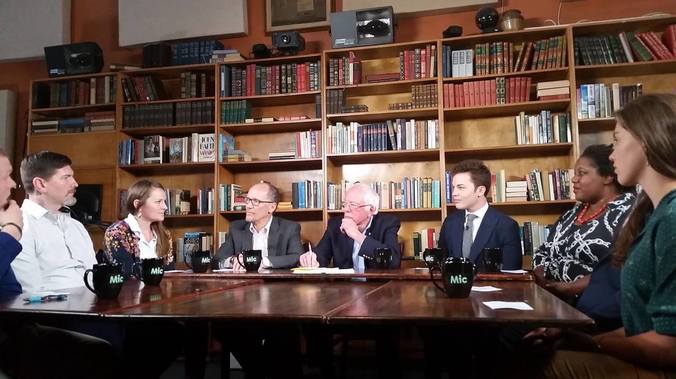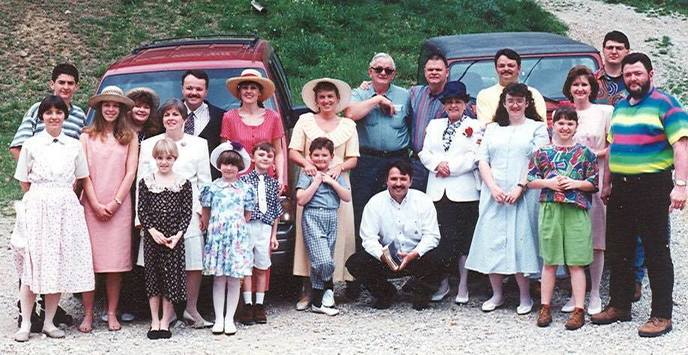|
By Robin Kunkel Code, KSEC Catalyst Summer Training Camp alum and Member of CKY Showing Up For Racial Justice 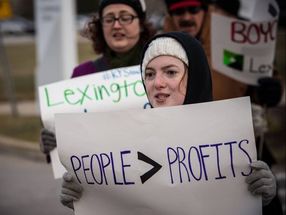 Robin at the KY Stands with Juarez - Lexmark Protest photo credit: Steve Pavey, Facebook Robin at the KY Stands with Juarez - Lexmark Protest photo credit: Steve Pavey, Facebook ‘We are what we repeatedly do. Excellence, therefore, is not an act, but a habit.’ -Aristotle I was once the activist who jumped from group to group and protest to protest, not knowing where I fit or what kind of work I should do. Honestly, I didn’t feel qualified to do anything. I don’t regret that time spent wandering around because it was part of what eventually led me to racial justice work. It was definitely not the most productive time of my life, though. Since committing myself to the work in between the protests, I’ve made learning about systemic racism part of my daily life through education, relationship-building, and A LOT of uncomfortable conversations. It’s the most difficult work I ever done, but also the most rewarding. There are so many rallies, marches, and protests lately, and just as many reasons to protest. But there also seem to be a large number of people who flood the streets for these actions and then melt away, not to be seen until the next large public event, just like I once did. While I don’t doubt the good intentions behind these appearances, I do doubt their effectiveness. I doubt our communal understanding of the what “activism” actually is. So I went to the dictionary. According to Merriam-Webster, activism is “the policy or action of using vigorous campaigning to bring about political or social change. Or a doctrine or practice that emphasizes direct vigorous action especially in support of or opposition to one side of a controversial issue.” So while some people view activism as showing up for controversial events, it’s actually a pattern of participation. Campaign, doctrine, practice: these are all repeated, sustained behaviors. If we consider the makeup of a campaign, a protest is merely one of many possible tactics to create change. Don’t get me wrong, protests are useful! They force conversations. They’re provocative, tense, a hint of the potential disruption to come if your opponent does not cooperate. But then what? Without the day-to-day work to back up these actions, all of that potential energy sadly remains potential and never becomes change. True change comes from the process, the continuation. If you stop taking action before you get what you want, then the outcome of your direct action was only a one-time inconvenience. Consistency is key. Consistency is what creates change. The intense energy of rallies and marches is fun, infectious, often motivating, but it is not sustainable. There must be solid steps in place to take all of those motivated people and move them into the more sustainable, less publicized work of the everyday- the habit of making change. Using diverse tactics (yes, including direct action) is to your advantage, too. No one tactic is necessarily good or bad. But no one tactic is effective in every situation or very successful on it’s own. When it comes to racial justice in particular, there’s a tendency to pit tactics (and the figures who embody them) against one another. Take, for example, Martin Luther King Jr,- a strong supporter of nonviolence, and Malcolm X, the man who famously demanded “justice by any means necessary.” These two are often viewed in my (admittedly, very white) community as opposites, representatives of the only 2 opposing methods, but I’m not convinced that’s how these men viewed one another. Some sources say that Malcolm believed he could make Martin’s work easier by providing an option that looked less pleasing and more disruptive to their mutual opponents, making Martin seem easier to cooperate with. Creating meaningful change in our community is going to take all of us and all of our tactics. No matter how much time or energy you have to give, I urge you to give everything you can and to make this work not just a scheduled activity on your calendar, but a part of your everyday thoughts and conversations. The work of change is a habit, a practice, and must take place in our everyday lives. Let’s all be a little more consistent, sustainable, and disruptive. 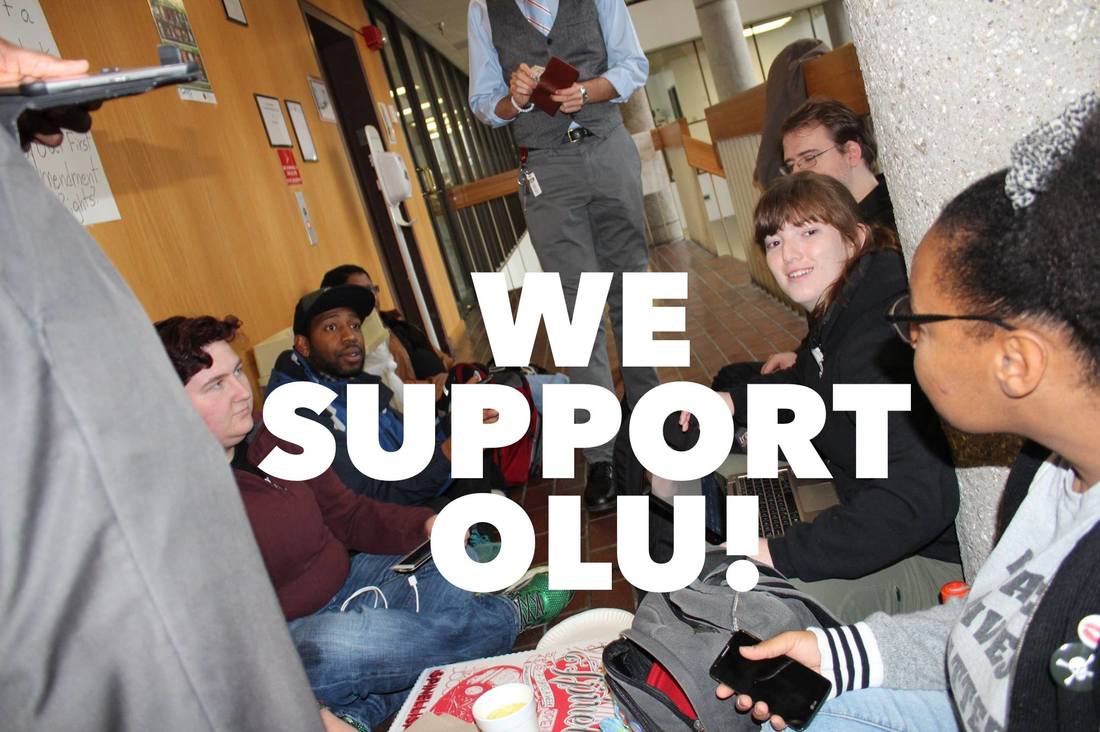 #BlackLivesMatter activists from across Kentucky have converged on Commonwealth Attorney Tom Wine's office in Louisville and are occupying the corridor demanding justice be served for Judge Olu Stevens! Judge Stevens was recused from criminal cases by the Chief Justice at the request of Wine for having the "audacity" to reject Jim Crow all-white juries in criminal cases with black defendants. photo credit: Jordan E. Mazurek, Facebook
0 Comments
Talking with Bernie Sanders and Telling DNC Chair Tom Perez to Support Radical Progressives4/21/2017 By Grace Rogers, Rowan County Senior High School and Morehead State University Environmental Eagles 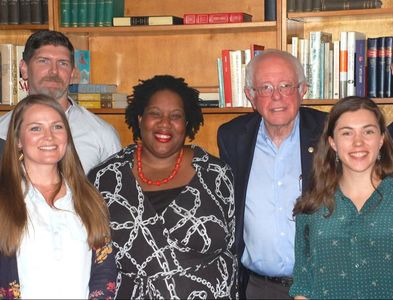 photo credit: Kentuckians For The Commonwealth, Facebook photo credit: Kentuckians For The Commonwealth, Facebook Tuesday morning, I found myself nervously gulping coffee and jittering my way down I-64 from Owingsville to Frankfort. I, a 17 year old from rural Kentucky, had been invited to a roundtable discussion with Senator Bernie Sanders and DNC Committee Chair Tom Perez. I was only going to be able to ask one question and I was unsure what it should be. The night before, I spoke with fellow roundtable participants Dana Beasley Brown and Jessica Hays Lucas, both of Kentuckians for the Commonwealth, about what issues were most important to target. The task of narrowing our concerns to one simple inquiry was daunting. How were we to condense the entirety of our lived-experiences and the challenges our neighbors face into one question? As I made my way through Lexington to pick up my friend Jon Johnson, a fellow KSEC member and eastern Kentuckian who I planned to bring along for moral support, I mulled over ways that I could pose a question to address the heart of the many issues that affect Kentuckians. Talking on the phone with KSEC Organizer Cara Cooper, I decided it was imperative to voice my concern about the lack of young progressive candidates in our state. In Kentucky, it is a rare occurrence for a person under the age of 40 to run for office, and when they do, it seems they gain little support from the establishment. If the Kentucky Democratic party and the DNC expect millennials to show up to the polls they need to support young progressives who want to run for office, whether that be for the local school board or for congress. Young people are not apathetic, there are simply very few candidates who appeal to our values, and very few establishment politicians who bother to listen to our ideas or struggles. This is what I chose to express to Senator Sanders and Perez because it addresses the base of Kentucky issues. If people continue to show up in low numbers to vote for moderate Democrats, radical Republicans will continue to win. If the Democratic party supports progressive candidates, more young people will feel motivated to show up to the polls. They will feel that they are supporting their values by voting. When Jon and I arrived at the Kentucky Coffeetree Cafe, where the roundtable was to take place, we were welcomed by employees of Mic, the national media company hosting the discussion. The room was buzzing with aspiring politicians, journalists, DNC employees, and roundtable participants. We introduced ourselves to each other while we waited for the cameras to be set up. I was reeling with anxiety, but once the roundtable began, my nerves began to dissipate. Sitting around a table with Senator Sanders and Perez was initially intimidating, but as my fellow Kentuckians began to ask questions, I realized that these two politicians, although given much weight by the media and the government, were no more powerful than any of us others at the table. It was empowering to hear the words of KFTC members Dana Beasley Brown, Tanya Torp, and Gary Bentley and to realize that their intellect and ability to frame their stories absolutely measured up to that of Senator Sanders and Tom Perez. Their compassion was obvious and immense in the face of celebrity politicians. This opportunity to directly compare the tactics of big time politicians to that of grassroots advocates created an intense juxtaposition which allowed me to see why People Power is so important. Justice is most likely to be achieved when decisions are being made by those who are directly affected by the issues at hand. I’m grateful to have left that room knowing that the voices of real, involved, working-class Kentuckians had been heard. It was wonderful to hear our voices uplifted and to know that politicians were listening to our struggles. Hearing Senator Sanders respond to questions about a Just Transition from coal to renewable energy in a way that was inclusive to the interests of coal mining families was refreshing and brought me hope. Asking Tom Perez to address the Democratic Party’s lack of support for radically progressive candidates felt powerful. Hearing Dana Beasley Brown’s story retold by Perez later that night during the rally in Louisville allowed me to feel as if Kentucky’s most dedicated advocates were finally being acknowledged.
Despite all of the positivity and empowerment this experience gave me, I felt let down the next morning when I read a photo caption from Tom Perez’s Facebook page which sorely misrepresented my identity and values. It reads, “Grace is from a coal mining family in Morehead, KY. She spoke with us about her ideas for getting more millennials and fellow high schoolers involved in the Democratic party, and how money can often be a barrier for young people trying to run for office.” This information is not factual. I am not from a coal mining family. My maternal grandparents have been distantly involved in the coal related industry, one working for a factory which produces coal conveyer belts, and the other being a biological surveyor of potential mine sites to ensure that they are environmentally suitable for mining. I am also not from Morehead. I live in Bath County Kentucky. I never once said that I would like young people and high schoolers to get involved in the Democratic Party. I have no opposition to this, but I would never limit my desire for young people’s involvement in democracy to one party. It is my hope that all young people develop the analytical skills to think outside of party lines. I understand that these are minor misrepresentations, but this oversight made me feel like an exaggerated story published to push the Democratic agenda. There is no need to tailor my story to their needs because there are real 17 year-olds with coal mining families who are trying to decide whether to stay in Kentucky or leave. If that’s the story that Tom Perez feels should be told, he can go to one of Kentucky’s many coal communities and ask a high schooler with a coal mining family about her concerns. Although this minor misstep was disheartening, I have profound gratitude for my fellow Kentuckians who spoke at the roundtable on Tuesday. They reminded me why it’s important to continue fighting this battle and that so many people are advocating for change across this state. The experiences that they brought to the table and the solutions that they offered through their questions gave me the energy to continue fighting for justice in my state as long as I’m here. I’m so glad that Senator Sanders and Tom Perez were willing to speak to us. Their notoriety and political acumen elevated our concerns more so than the media generally does. I feel as if I’ve finally been heard. By Ivy Brashear, Appalachian Transition and Communications Associate at MACED  Ivy Ivy Della Combs Brashear had had enough. She backed her Cadillac long-ways across the road in front of her house, lit the Virginia Slim in her mouth, pulled her .38 pistol from her purse, and waited, stone-faced and determined, for the next coal truck to come along. The trucks had been running day and night up and down the road in front of her house every day for weeks, coating every bit of furniture in and outside her home with a thick layer of grey coal dust. There’s only so many times a woman bound to the code of Clorox can clean up after someone else’s mess before the time comes to act. She wasn’t afraid of jail – “They’ll give me three hot meals a day and a place to sleep!” – she was more interested in defending her home from unwanted intrusions. Fierce is a good word for Della Combs: Fiercely loyal to her children and grandchildren. Fierce advocate for doing unto others as you would have them do unto you. Fierce mountain woman who had big dreams of city life, playing piano and singing in Chicago or New York City, but who instead married a man her mother wanted her to before graduating high school, and stayed with him until the end of her life because of a fierce sense of duty. To me, though, she was Granny Della – fierce storyteller who had the most enormous zest for life and love, with the heart to match. Her laugh seemed to always echo off of the walls and reverberate off of the hills that held the holler. It could fill you up, that laugh, and shake off your troubles for you. She always wore lipstick and powder, and had arthritis in her toes from a youth spent in high heels. She maintained a standing hair appointment every Friday at Dascum’s in Vicco, and earned her GED when she was in her 40s. Her door was always open to me, and since I lived just up the hill from her, I was often in her kitchen as she put up peaches in Ziploc bags for winter, or watered her beloved hanging ferns that encased her porch. She played piano every Sunday at Lone Pine Baptist Church – the family church founded by my great-grandfather, less than a mile from my home. When she told me I had “piano fingers,” I felt so special, like she had chosen me to carry on her music. 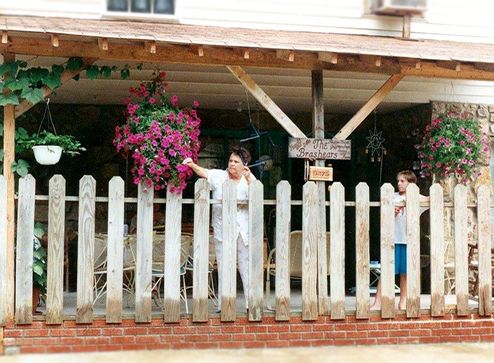 Della and Ivy Della and Ivy She was gregarious and out-spoken, once telling a man to “get a life and get a job,” another time telling Lone Pine’s preacher that he was wrong about God not giving people talent they didn’t have to learn. But I would never – in my wildest dreams or imaginings – disrespect her by calling her a lunatic, as J.D. Vance so often refers to his Mamaw in “Hillbilly Elegy.” The fact that people will read his book, and assume that all Appalachian people are trying to actively run away from their culture, and that if they are smart, they will understand it to be less than and the people they came from to be crazy lunatics is, to me, one of the more personal attacks that Vance hurls at Appalachian people in his 261-page simultaneous fetishization and admonishment of my culture. "Elegy" has no class, no heart, and no warmth. It's a poorly written appropriation of Appalachian stereotypes that presents us as a people who aren't worthy of anything but derision and pity, and who cannot be helped because we refuse to help ourselves. It ignores the systemic capitalist oppression that encourages persistent poverty. It assumes there is some special sect of the working class that is especially dedicated to white people. It is rife with fragile masculinity that actively diminishes the critical role that Appalachian women play in the culture, the resistance, in the workforce, and in the new economy. I come from dignity and grace and laughter and joy, and while I do not discount the difficult childhood that Vance lived through and his own lived experience, "Hillbilly Elegy" erases and erodes any Appalachian experience outside his own non-Appalachian experience by reinforcing repeatedly that Appalachian “hillbilly” culture is somehow deficient and morally decrepit, and that it is something to be overcome. Misrepresentation of Appalachia matters for several reasons. It obscures and intentionally eclipses the pride and dignity of being Appalachian. It has told us we should be ashamed of who we are, where we come from, and the people in our blood. It says to us that we aren't worthy or deserving of anything more than being the butt of a joke. It hits us hard in our guts because the truth is way more complicated and way more real, and nobody likes tales to be carried about them. But I think the thing that bothers me most is this: Appalachian misrepresentation actively and intentionally ignores and excludes the real life, lived experiences of all but a minority of Appalachian people. It ignores my fierce Granny Della. It ignores my Granny Hazel, who smelled of starch and taught me how to feed the chickens and always had breakfast waiting on me when I had to stay with her on a sick day. Misrepresentation certainly doesn't tell the stories of my Grandpa Earl, who liberated concentration camps, who referred to me exclusively by my middle name, Jude, and who always had a Werther's candy ready for me. My Mom and Dad are left out. They owned a gas station that hired local high school kids. They hung Modigliani and Van Gogh and Paolo Solari prints on the walls of our home. They played NPR every Sunday morning. They fought the dam at Red River Gorge, the racists in Hazard, the strip mining companies for which Dad used to work, and they both went back to school later in life and got degrees. It ignores me: a young, queer Appalachian with roots ten-generations deep in eastern Kentucky, who holds within me the fierce loyalty and determination of my Granny Della, the unconditional compassion of my Granny Hazel, the individuality of my parents, and the mountain heart and soul of all my ancestors combined. My family is totally, completely, utterly left out and ignored, and so are the families of so many other Appalachians that are just like mine. We are Appalachian, too, but in “Hillbilly Elegy,” and so many other representations and think-pieces like it, we are cast aside for the lies we tell ourselves about the mythical other and perceived, inherent difference. “Hillbilly Elegy’s” danger is that it continues the long tradition of understanding and presenting Appalachia as a monolithic region and group of people. For those of us who are trying to shift the narrative of our place to be more honest and complex as a way to support just economic transition, facing mass-market, much devoured and incomplete narratives like “Hillbilly Elegy” is akin to mining coal with a pick ax. Ivy originally presented this essay on a panel discussion about "Hillbilly Elegy" at the 2017 Appalachian Studies Association Conference at Virginia Tech in Blacksburg, Virginia. Bio: Ivy Brashear is the Appalachian Transition and Communications Associate at the Mountain Association for Community Economic Development in Berea, Ky. Before joining MACED, she was a reporter at the Hazard Herald in Hazard, Ky. She currently sits on the New Economy Coalition board of directors, is on the steering committee of the Kentucky Rural-Urban Exchange, and is a member of the Young Climate Leaders Network. She holds a Bachelor’s degree from Eastern Kentucky University in Journalism and Appalachian Studies, and a Master’s degree from the University of Kentucky in Community and Leadership Development. She is a tenth-generation Appalachian, and a fifth-generation eastern Kentuckian, where her family still lives on land settled by her great-great grandfather in the 1830s.
|
AboutThe Young Kentuckian is a blog of the Kentucky Student Environmental Coalition where youth share their work and ideas for Kentucky's bright future. Follow The Young Kentuckian on Facebook!
Categories
All
Archives
March 2023
|
